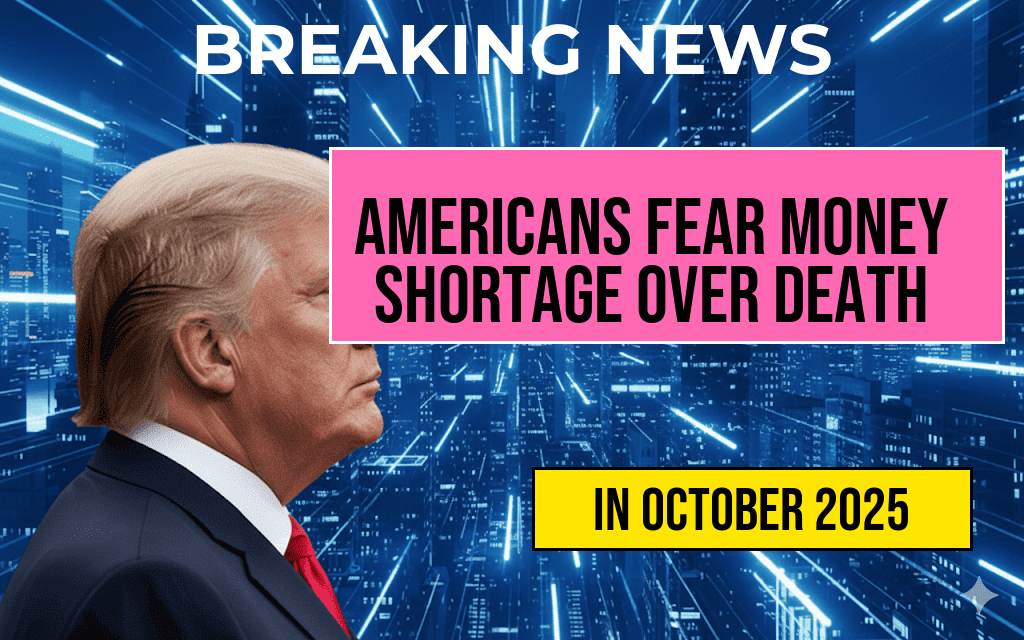A recent survey reveals a startling trend in the American psyche: approximately two-thirds of Americans express greater fear of running out of money than of death itself. Conducted by the Financial Anxiety Research Group, this study highlights a growing anxiety about financial stability that seems to overshadow even the most profound existential concerns. With economic uncertainty looming, individuals are increasingly concerned about their financial futures, revealing a deeper societal issue tied to the rising cost of living, stagnant wages, and an unpredictable job market. As income disparities widen, the fear of financial insufficiency appears to be a significant source of stress, prompting a reevaluation of what truly constitutes a “fear of death.”
Financial Concerns Outweigh Existential Threats
The survey, which gathered responses from over 2,000 American adults, paints a vivid picture of contemporary anxieties. Among the participants, 68% reported being more afraid of financial ruin than mortality. This shift in priorities raises questions about how economic pressures have reshaped American values and perceptions of security.
Key Findings from the Survey
- Demographic Disparities: Younger generations, particularly Millennials and Gen Z, exhibited heightened financial anxiety compared to older generations.
- Gender Differences: Women reported a greater fear of financial instability than men, with 72% indicating that money concerns overshadowed their fear of death.
- Regional Variations: Residents in urban areas expressed more financial anxiety than those in rural settings, likely due to higher living costs.
The Economic Landscape and Its Impact
Several factors contribute to this rising fear of financial instability. The aftermath of the COVID-19 pandemic has left a lasting impact on the economy, with many Americans facing job loss or reduced income. Additionally, inflation rates have surged, making it increasingly difficult for individuals to make ends meet. According to the Bureau of Labor Statistics, inflation reached a peak of 9.1% in June 2022, significantly affecting household budgets.
Cost of Living Increases
Housing, healthcare, and education costs have skyrocketed, exacerbating financial stress. A recent report from the Economic Policy Institute indicates that the cost of living has risen at a rate faster than wages, leading to a growing concern about financial security.
| Year | Cost of Living Increase (%) | Wage Growth (%) |
|---|---|---|
| 2010 | 1.6 | 2.2 |
| 2015 | 0.1 | 2.5 |
| 2020 | 1.2 | 3.0 |
| 2022 | 9.1 | 5.1 |
| 2023 | 4.0 | 4.5 |
Shifting Attitudes Toward Money and Security
As fear of running out of money escalates, many Americans are reassessing their financial strategies. Increased interest in personal finance education, budgeting tools, and investment strategies reflects a shift towards prioritizing financial literacy. Financial advisors report a surge in clients seeking guidance on long-term planning and wealth management.
Community Support and Resources
In response to these financial anxieties, various community organizations and nonprofits have emerged to provide support. Programs offering financial counseling, budgeting workshops, and debt management assistance aim to equip individuals with the tools necessary to navigate their financial challenges. Resources like the National Endowment for Financial Education (NEFE) and the Financial Literacy and Education Commission (FLEC) are critical in promoting financial well-being across communities.
A Future of Financial Awareness
The findings of this survey underscore a critical need for ongoing dialogue about financial stability in America. As economic conditions continue to evolve, the fear of financial inadequacy may remain a pervasive concern. By fostering a culture of financial literacy and resilience, individuals can better navigate the complexities of their financial futures.
For those interested in exploring the implications of financial anxiety further, resources such as Forbes and Wikipedia provide valuable insights into the current landscape of financial well-being in the United States.
Frequently Asked Questions
What does the survey reveal about Americans’ fears?
The survey indicates that two-thirds of Americans are more afraid of running out of money than they are of death, highlighting significant concerns about financial security.
Why are many Americans concerned about financial stability?
Many Americans are concerned about financial stability due to rising costs of living, inadequate savings for retirement, and the unpredictability of the economy.
How does this fear compare to other common fears?
This fear of running out of money surpasses fears related to health, job security, and even death, showcasing the profound impact of financial anxiety on mental well-being.
What age groups are most affected by this fear?
While fear of running out of money spans across various age groups, it is particularly pronounced among younger adults and those nearing retirement age, who feel unprepared for future expenses.
What steps can individuals take to mitigate this fear?
Individuals can take proactive steps such as creating a budget, increasing savings, seeking financial advice, and planning for retirement to alleviate the fear of financial insecurity.

Leave a Reply